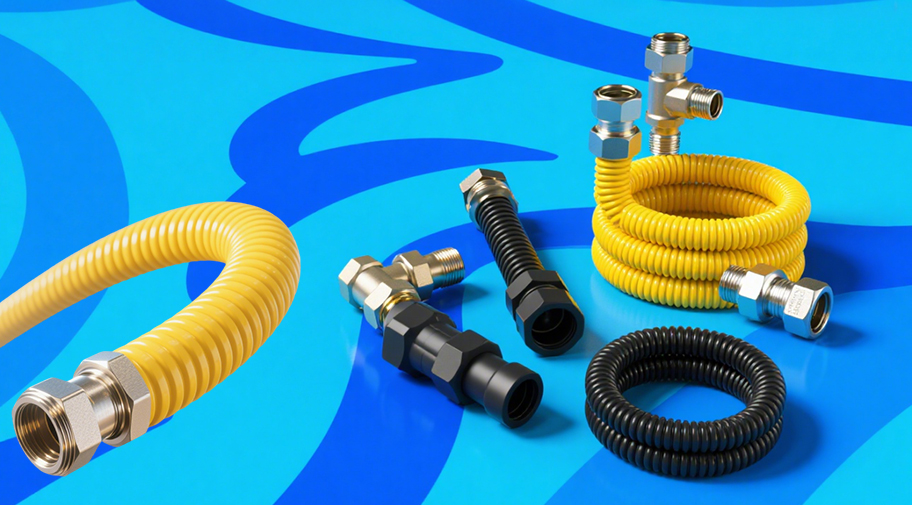-
+86-574-62166708
-
-









Sanitary systems (including medical hygiene, food and beverage processing, pharmaceutical production, and public sanitation facilities) have extremely strict requirements for pipelines, such as high cleanliness, corrosion resistance, easy cleaning, non-toxicity, and compliance with hygiene standards. Traditional pipelines (such as plastic pipes or ordinary metal pipes) often have problems such as easy contamination, difficult cleaning, or corrosion in harsh environments. Stainless steel bellows, with their material properties and structural design, can perfectly meet the special needs of sanitary systems and become a reliable pipeline solution. The following elaborates on specific application solutions from multiple dimensions.
Precise Matching of Core Performance Advantages with Sanitary System Requirements
Sanitary systems operate in environments characterized by frequent cleaning (CIP/SIP), contact with various cleaning agents (acids, alkalis), high temperature disinfection, and strict prevention of microbial growth. The performance of stainless steel bellows can accurately meet these requirements:
Excellent Corrosion Resistance: Made of 304 or 316L stainless steel, it can resist corrosion from various cleaning agents (such as peracetic acid, sodium hydroxide) and disinfectants used in sanitary systems. 316L stainless steel, with its higher molybdenum content, has stronger resistance to chloride ion corrosion, making it suitable for environments with high salt content (such as seafood processing) or frequent use of chlorine-containing disinfectants.
High Cleanliness and Non-toxicity: The inner wall of the bellows is smooth (Ra ≤ 0.8μm) after electrolytic polishing, without dead corners or pores, which can prevent the adhesion and reproduction of microorganisms (bacteria, fungi, etc.). It does not release harmful substances and complies with international hygiene standards such as FDA, 3A, and USP Class VI, ensuring that the medium (water, food, medicine) is not contaminated.
Temperature Resistance and Adaptability to Disinfection: It can withstand high-temperature disinfection processes (such as 121℃ saturated steam sterilization for 30 minutes) and low-temperature environments (down to -40℃), adapting to the frequent temperature changes in sanitary systems during cleaning and operation. It will not deform or aging due to temperature fluctuations.
Smooth Inner Wall and Low Pollution Risk: The ultra-smooth inner surface reduces the retention of media residues, making it easy to clean during CIP (Clean-in-Place) processes. Compared with rough-surfaced pipes, it can reduce the frequency of cleaning and the use of cleaning agents, saving costs and reducing environmental impact.
Mechanical Strength and Long Service Life: It has high tensile strength (≥520MPa) and impact resistance, can withstand the pressure fluctuations in sanitary pipelines (usually 0.1-1.0MPa), and is not easy to be damaged during installation or use. Its service life can reach more than 10 years, far exceeding that of plastic pipes (3-5 years), reducing the frequency of replacement and maintenance.
Typical Application Scenarios
Stainless steel bellows can solve the application pain points of traditional pipelines in different types of sanitary systems:
Medical and Healthcare Sanitary Systems
Medical Water Supply Pipelines: Used for transporting purified water, sterile water, and dialysis water in hospitals. The smooth inner wall and corrosion resistance of the bellows prevent secondary pollution of water quality, ensuring the safety of medical water use.
Disinfection Pipeline Connections: Connecting autoclaves, sterilizers, and other equipment, it can withstand high-temperature and high-pressure steam disinfection, ensuring the tightness of the pipeline during the disinfection process.
Wastewater Discharge in Operating Rooms: Used for the discharge of contaminated wastewater in operating rooms, 316L stainless steel bellows can resist corrosion from blood, drugs, and disinfectants in the wastewater.
Food and Beverage Processing Sanitary Systems
Raw Material Transportation Pipelines: In dairy, beverage, and brewing production lines, it is used to transport raw materials (milk, juice, syrup, etc.). The non-toxic and smooth inner wall avoids material residue and bacterial growth, meeting food-grade hygiene requirements.
Cleaning Pipeline Systems: Connecting CIP cleaning equipment and production equipment, it can withstand the erosion of high-temperature cleaning fluids (80-95℃) and chemical cleaning agents, ensuring effective cleaning without pipeline damage.
Steam Sterilization Pipelines in Food Factories: Used for steam transportation in food sterilization processes, it adapts to frequent high-temperature steam impact and maintains stable performance.
Pharmaceutical Production Sanitary Systems
API (Active Pharmaceutical Ingredient) Transportation: In pharmaceutical workshops, it is used to transport APIs and intermediate products. The bellows meets GMP standards, with no adsorption or leaching, ensuring the purity of pharmaceuticals.
Purified Water and Water for Injection Pipelines: Connecting water treatment equipment and filling lines, it can withstand high-temperature circulation of purified water and meet the strict hygiene requirements of water for injection systems.
Public Sanitary Facilities
Water Supply Pipelines in Public Bathrooms: Used in high-traffic public places such as gyms and swimming pools, it resists corrosion from chlorine-containing water and has good pressure resistance to adapt to frequent water use.
Wastewater Treatment Pipelines in Public Areas: For the transportation of domestic wastewater in stations, airports, etc., it resists corrosion from organic matter in wastewater and is not easy to block due to its smooth inner wall.
Key Selection Points and Installation Specifications
1. Scientific Selection
Material Selection: 304 stainless steel is suitable for general sanitary environments (such as public bathrooms); 316L stainless steel is preferred for harsh environments with strong corrosion (such as pharmaceutical production, seafood processing) or frequent use of strong disinfectants.
Caliber and Pressure Rating: Select calibers (DN15-DN100) according to the flow requirements of the sanitary system. For example, small calibers (DN15-DN32) are used for medical water supply, and medium calibers (DN40-DN80) are used for food processing pipelines. The pressure rating should be ≥ 1.5 times the working pressure (usually 1.0-1.6MPa).
Surface Treatment: The inner wall must undergo electrolytic polishing (Ra ≤ 0.8μm) to ensure smoothness and easy cleaning; the outer wall can be polished or passivated to enhance corrosion resistance.
Connection Methods: Sanitary clamp connections (Tri-Clamp) are commonly used, which are easy to disassemble and clean, suitable for systems requiring frequent maintenance; flanged connections with sanitary gaskets (such as EPDM, PTFE) are used for high-pressure pipelines to ensure sealing and hygiene.
2. Installation Specifications
Cleanliness Control: Before installation, the bellows must be cleaned (using pure water or alcohol) to remove oil, rust, and other impurities. For pharmaceutical and food systems, degreasing and passivation treatments are required to meet aseptic requirements.
Avoid Dead Corners: During installation, minimize the use of elbows and tees. If necessary, use large-radius sanitary elbows to avoid dead corners where dirt accumulates. The bending radius of the bellows should be ≥ 5 times the pipe diameter to prevent deformation affecting cleanliness.
Sealing Requirements: The sealing gaskets must be food-grade or medical-grade (such as EPDM for high temperature, PTFE for acid and alkali resistance) and be replaced regularly to prevent bacterial growth due to gasket aging.
Sterilization and Testing: After installation, conduct pressure testing (using pure water or compressed air) to ensure no leakage. For aseptic systems, perform SIP (Sterilization-in-Place) sterilization to verify that the pipeline meets microbial limits (≤ 10 CFU/100mL).
Application Benefits
Guarantee Hygiene Safety: The smooth inner wall and corrosion resistance of stainless steel bellows prevent microbial contamination and medium deterioration, reducing product scrapping in food and pharmaceutical production and avoiding medical accidents in healthcare systems.
Reduce Maintenance Costs: The long service life and easy cleaning characteristics reduce the frequency of pipeline replacement and cleaning. Compared with plastic pipes, the annual maintenance cost can be reduced by 40%-60%.
Comply with Regulatory Requirements: Meet international hygiene standards (FDA, 3A, GMP, etc.) and national regulatory requirements for sanitary systems, avoiding penalties or production suspension due to non-compliance.
Improve Production Efficiency: The reliable performance ensures stable operation of sanitary systems, reducing downtime caused by pipeline failures. The easy disassembly of sanitary connections speeds up maintenance and cleaning processes.
Summary
Stainless steel bellows, with their corrosion resistance, high cleanliness, and compliance with hygiene standards, provide a "safe, reliable, and efficient" pipeline solution for sanitary systems. Whether in medical, food, pharmaceutical, or public health fields, they can meet the strict hygiene requirements and complex working conditions, laying a solid foundation for the safe operation of sanitary systems.